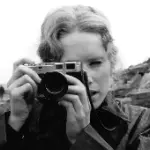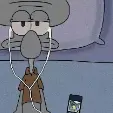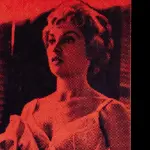Every episode title seems like a famous quote. After researching, the director did indeed reference classic literature and film works, making the titles better reflect the characters' mentality. Additionally, the artworks accompanying each episode title, except for the first episode, are creations by David Choe, who portrays Isaac.
Episode 1: “The Birds Don’t Sing, They Screech in Pain”
"The trees are in misery, and the birds are in misery. I don’t think they sing. They just screech in pain… Taking a close look at what’s around us, there is some sort of harmony: It’s the harmony of overwhelming and collective murder." — Werner Herzog
The title of this episode is inspired by the German filmmaker Werner Herzog's documentary Burden of Dreams. Much like Herzog's mention of birds in the quote, Amy and Danny initially appear to be ordinary people. However, after their road rage incident, it becomes apparent that these characters harbor hidden pain and serious issues beneath the surface.

Episode 2: “The Rapture of Being Alive”
"I don’t think the meaning of life is what we’re seeking. I think it’s the experience of being alive… so that our life experiences on the purely physical plane will have resonances with our innermost being and reality so that we feel the rapture of being alive." — Joseph Campbell

The phrase "the rapture of being alive" comes from an interview with Joseph Campbell, an American writer, in 1988. In 1988, during an interview program hosted by Bill Moyers, the American writer Joseph Campbell offered this response when asked about the meaning of life. This answer is particularly fitting for the second episode, as Amy and Danny become increasingly fixated on mutual revenge. Their conflict touches upon their most primal aspects, allowing them to express hidden impulses and emotions, or, one could say, experience the rapture of being alive.
Episode 3: "I Am Inhabited by a Cry"
"I am inhabited by a cry. Nightly it flaps out. Looking, with its hooks, for something to love." — Sylvia Plath
In her poem "Elm," Sylvia Plath wrote about a dark presence within her, crying for love in the night. Amy and Danny hope that by obtaining what they desire in life, they can easily rid themselves of the darkness within. The title also hints at the seventh episode when both characters finally achieve their dreams, only to find an emptiness lingering within.

Episode 4: “Just Not All at the Same Time”
"You can have it all, just not all at the same time." — Betty Friedan
When asked during a meeting whether women could have it all, feminist and writer Betty Friedan provided a candid response. This response resonates with the plot of the fourth episode: during a Q&A session in Las Vegas, Amy's fans believe she has it all—a beautiful family, a picturesque home, and a successful career. She assures her fans they can follow in her footsteps. However, the reality portrayed in the storyline is that balancing marriage, parenting, career, and personal fulfillment is not easy for Amy.

Episode 5: "Such Inward Secret Creatures"
"We are such inward secret creatures, that inwardness the most amazing thing about us, even more amazing than our reason. But we cannot just walk into the cavern and look around. Most of what we think we know about our minds is pseudo-knowledge. We are all such shocking poseurs, so good at inflating the importance of what we think we value. "— Iris Murdoch
Inspired by a passage from Iris Murdoch's novel "The Sea, The Sea," the fifth episode reveals the superficial values that each character attempts to conceal. This is evident in Fumi's pride and concern for her son George and Naomi seeking a letter of recommendation from Amy. Each character self-importantly considers themselves, bordering on narcissism, while simultaneously making efforts to hide their ulterior motives.
Episode 6: "We Draw a Magic Circle"
"We draw a magic circle and shut out everything that doesn’t agree with our secret games. Each time life breaks the circle, the games turn grey and ridiculous. Then we draw a new circle and build a new defense." — Ingmar Bergman
Quoted from Ingmar Bergman's film Through a Glass Darkly, this episode sees Amy entangled in her web of lies, desperately wanting to believe the series of unfortunate events were not her fault.
Episode 7: "I Am a Cage"
"I am a cage, in search of a bird." — Franz Kafka
This sentence from Kafka's "Die Zürauer Aphorismen" describes humanity as an empty vessel, constantly seeking meaning. In the pursuit of meaning, Danny, engrossed in his conflict, almost makes a grave mistake, seeking solace in a church. On the other hand, Amy confides in George, expressing a constant feeling in her chest that "feels like the ground." Both characters experience a profound sense of helplessness due to their inner struggles and feelings of being lost.
Episode 8: “The Drama of Original Choice”

Moral choice is free, and therefore unforeseeable. The child does not contain the man he will become. Yet, it is always based on what he has been that a man decides upon what he wants to be. He draws the motivations of his moral attitude from within the character that he has given himself and from within the universe which is its correlative. Now, the child set up this character and this universe little by little, without foreseeing its development. He was ignorant of the disturbing aspect of this freedom which he was heedlessly exercising. He peacefully abandoned himself to whims, laughter, tears, and anger which seemed to him to have no morrow and no danger, and yet which left ineffaceable imprints about him. The drama of original choice is that it goes on moment by moment for an entire lifetime, that it occurs without reason, before any reason, that freedom is there as if it were present only in the form of contingency. This contingency recalls, in a way, the arbitrariness of the grace distributed by God in Calvinistic doctrine. Here too there is a sort of predestination issuing not from an external tyranny but from the operation of the subject itself. Only, we think that man has always a possible recourse to himself. There is no choice so unfortunate that he cannot be saved. — Simone de Beauvoir" — Simone de Beauvoir

The feminist writer Simone de Beauvoir, in her book "The Ethics of Ambiguity," discusses how the choices we make today are predetermined by our past and the environments in which we were raised. The eighth episode delves into the pasts of Amy and Danny, exploring their respective journeys from birth through childhood to adulthood. Observing their developmental backgrounds allows us to understand why they are currently ensnared in their darkness.
Episode 9: "The Great Fabricator"
"Attachment is the great fabricator of illusions; reality can be obtained only by someone who is detached." — Simone Weil
Simone Weil, in her first published work "Gravity and Grace," explores the idea that to fully embrace reality, one must undergo a kind of loss. In the ninth episode, the two characters find themselves growing distant from those closest to them: Danny confesses to Paul that he discarded his brother's college application letter years ago because he wanted his brother to stay with him, while George decides to leave with his daughter due to the threat posed by the robbery resulting from Amy's actions. With their loved ones departing, perhaps they finally realize the chaos they have created.
Episode 10: "Figures of Light"
"One does not become enlightened by imagining figures of light, but by making the darkness conscious." — C.G. Jung
Carl Jung, in Volume 13 of "Alchemy Studies," wrote that to progress forward, we must first confront our dark side. In the grand finale, Amy and Danny finally reach the end of their conflict: the two adversaries drive off a cliff, ending up stranded in the desert together. By this point, they have shown each other their terrible sides, from urinating on the floor to destroying a car. The conflicts between Amy and Danny bring their worst aspects to the surface. However, the experience in the desert brings them comfort as they realize that the other has also been hurt, and they are equally flawed. This realization allows the two characters to continue being themselves and to move forward with their lives.













































Share your thoughts!
Be the first to start the conversation.